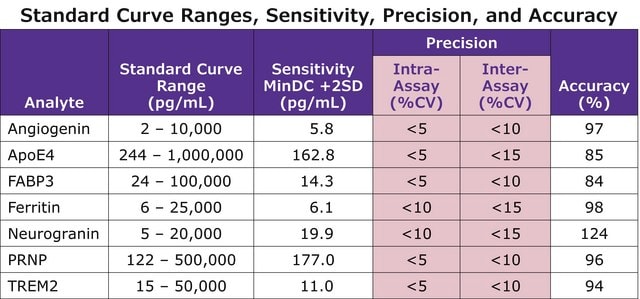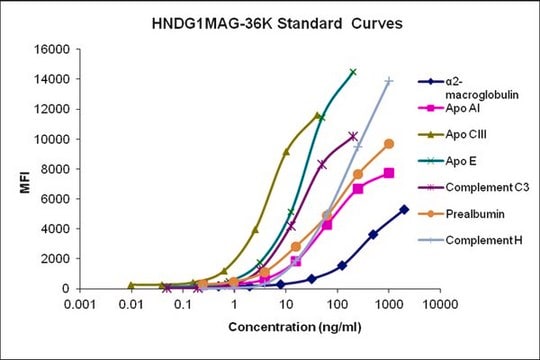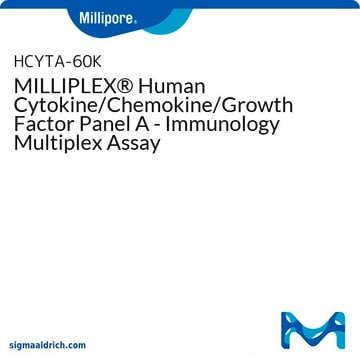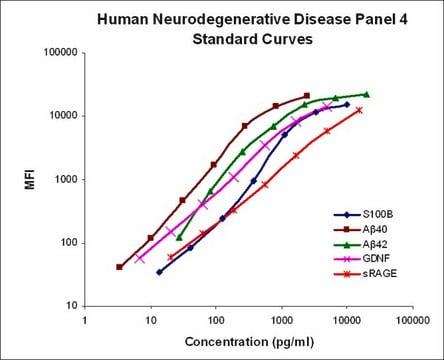HND3MAG-39K
MILLIPLEX® Human Neurological Disorders Magnetic Bead Panel 3 - Neuroscience Multiplex Assay
The analytes available for this multiplex kit are: AGT, Contactin-1, Fetuin A, Kallikrein-6, OPN, sSOD1, sSOD2
About This Item
Recommended Products
Quality Level
species reactivity
human
manufacturer/tradename
Milliplex®
assay range
accuracy: 69-92%
(Cerebrospinal fluid (CSF))
accuracy: 71-107%
(Serum)
standard curve range: 0.03-25 ng/mL
(SOD2)
standard curve range: 0.04-30 ng/mL
(Kallikrein-6)
standard curve range: 0.04-30 ng/mL
(SOD1)
standard curve range: 0.08-60 ng/mL
(Contactin-1)
standard curve range: 0.14-100 ng/mL
(Osteopontin (OPN))
standard curve range: 1.37-1,000 ng/mL
(AGT)
standard curve range: 4.12-3,000 ng/mL
(Fetuin A)
technique(s)
multiplexing: suitable
detection method
fluorometric (Luminex xMAP)
shipped in
wet ice
General description
NOTE: For serum and plasma samples Fetuin A requires a higher (1:4000) dilution and therefore must be assayed alone as a singleplex. For serum or plasma samples all analytes, except Fetuin A, require a 1:50 dilution and may be assayed together as a multiplex.
The MILLIPLEX® Human Neurological Disorders Bead Panel 3 (Cat. No. HND3MAG-39K) is to be used for the simultaneous quantification of the following 7 analytes in any combination in CSF, serum or plasma samples: Angiotensinogen (AGT), Contactin-1, Fetuin A, Kallikrein-6, Osteopontin (OPN), Soluble Superoxide Dismutase 1 (SOD1), Soluble Superoxide Dismutase 2 (SOD2).
NOTE: For serum and plasma samples Fetuin A requires a higher (1:4000) dilution and therefore must be assayed alone as a singleplex. For serum or plasma samples all analytes, except Fetuin A, require a 1:50 dilution and may be assayed together as a multiplex.
Panel Type: Neuroscience
Specificity
There was no or negligible cross-reactivity between the antibodies for an analyte and any of the other analytes in this panel.
Application
- Analytes: Angiotensinogen (AGT), Contactin-1, Fetuin A, Kallikrein-6, Osteopontin (OPN), Soluble Superoxide Dismutase 1 (SOD1), Soluble Superoxide Dismutase 2 (SOD2)
- Recommended Sample type: CSF, serum, and plasma
- Recommended Sample dilution: 1:100 for CSF, 1:50 for serum and plasma for all analytes except Fetuin A, 1:4000 for serum and plasma for Fetuin A
- NOTE: Fetuin A cannot be assayed along with other analytes in serum/plasma samples. Fetuin A should be diluted 1:4000 in the kit Assay Buffer and analyzed as a singleplex for serum and plasma samples
- Assay Run Time: One day or Overnight
- Research Category: Neuroscience
Features and Benefits
Packaging
Storage and Stability
Other Notes
Legal Information
Disclaimer
Signal Word
Danger
Hazard Statements
Precautionary Statements
Hazard Classifications
Acute Tox. 4 Dermal - Acute Tox. 4 Inhalation - Acute Tox. 4 Oral - Aquatic Chronic 2 - Eye Dam. 1 - Skin Sens. 1 - STOT RE 2
Target Organs
Respiratory Tract
Storage Class Code
10 - Combustible liquids
Certificates of Analysis (COA)
Search for Certificates of Analysis (COA) by entering the products Lot/Batch Number. Lot and Batch Numbers can be found on a product’s label following the words ‘Lot’ or ‘Batch’.
Already Own This Product?
Find documentation for the products that you have recently purchased in the Document Library.
Related Content
Learn how multiplex detection of Alzheimer’s disease biomarkers, using the MILLIPLEX® Human Amyloid Beta and Tau Magnetic Bead Panel, allows for a different perspective on neurodegenerative disease research.
Learn how multiplex detection of Alzheimer’s disease biomarkers, using the MILLIPLEX® Human Amyloid Beta and Tau Magnetic Bead Panel, allows for a different perspective on neurodegenerative disease research.
Learn how multiplex detection of Alzheimer’s disease biomarkers, using the MILLIPLEX® Human Amyloid Beta and Tau Magnetic Bead Panel, allows for a different perspective on neurodegenerative disease research.
Learn how multiplex detection of Alzheimer’s disease biomarkers, using the MILLIPLEX® Human Amyloid Beta and Tau Magnetic Bead Panel, allows for a different perspective on neurodegenerative disease research.
Our team of scientists has experience in all areas of research including Life Science, Material Science, Chemical Synthesis, Chromatography, Analytical and many others.
Contact Technical Service












